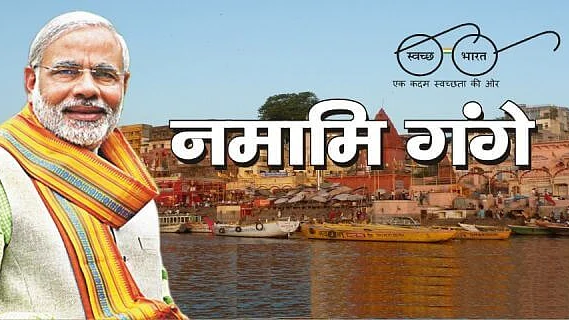Germany gives govt a reality check on Namami Gange Mission
While the Modi govt has said that the river cleaning process would be completed before the next elections, German officials involved in Namami Gange noted that even the STPs are not functional now

It is all but impossible to clean-up the Ganges by the end of 2018, the deadline set by Prime Minister Narendra Modi's government to depollute the 2,525-km long holy Hindu river.
The ominous warning has come not come from within the government as on previous occasions, but from Germany, which is a major aid provider of India and financially involved in the ₹20,000-crore Namami Gange Project.
"It took us almost 30 years and 45 billion Euros to clean up the Rhine river. The Ganges is almost twice the length of the Rhine river. So, that should give you the essence of the challenge we are facing," said Dr Jaisper Wieck, the Charge’d affairs at the German Embassy in New Delhi, as he briefed mediapersons on Germany's contribution in cleaning-up the Ganga, whose basin is home to almost half of India's population.
Germany entered the project in 2016, after a meeting at the Hannover Fair between Germany's Chancellor Angela Merkel and Prime Minister Narendra Modi in April 2015. The two countries signed an implementation agreement in the same year.
Dr Tyagi further informed that the German money would be routed through the German Development Bank (The KfW), and would be repaid on a subsidised interest rate over a time period of 20 years, with five years as grace period
"Chancellor Merkel had been the Minister of Environment in Germany in the early 90s, when the government was cleaning up the Rhine river. She believes that India could capitalise on the experience we had with our river cleaning programme. It is a focus area of our bilateral cooperation," said Dr Wieck.
Germany's successful effort in cleaning up the Rhine is lauded globally as an example of sustainable water management and conservation.
In August 2017, Germany officially sealed a aid deal of ₹900 crore during a meeting between its Ambassador to India Dr Martin Ney and Uttarakhand's chief minister Trivendra Singh Rawat. Overall, the EU state has pledged an assistance of 120 million Euros, or ₹100 crore, to the state of Uttarakhand, where the river originates.
Dr Wieck said that the German money was mostly going into upgrading the exisiting sewer treatment plants (STPs) and constructing new ones across 16 cities in the hill state. Around 90 percent of garbage and industrial effluents into Indian rivers go untreated, according to studies by Germany.
"When we entered the project in 2016, many of the STPs were overloaded and most of the discharge into the Ganga was going untreated," recalled the German diplomat.
Commenting on the water quality of the Ganges in Uttarakhand, Dr Wieck observed, "When it enters Haridwar, the water quality falls under class B. By the time it leaves the city, it's water quality has already been degraded to class D."
While the Modi government has said that the river cleaning process would be completed before the next elections, if not by the 2018 deadline, German government officials involved in Namami Gange noted that even the STPs are not functional at this stage.
"We have identified 16 priority towns in Uttarakhand, which will have 21 STPs. Once all of them are up and running by year-end, no sewage will go untreated into the Ganges in Uttarakhand," said Dr Vikrant Tyagi, the Programme Coordinator, India-EU Partnership, at GIZ, the German aid agency involved in the mission. GIZ is working in Uttarakhand in collaboration with State Project Management Group, India's agency involved in the project.
Dr Tyagi further informed that the German money would be routed through the German Development Bank (The KfW), and would be repaid on a subsidised interest rate over a time period of 20 years, with five years as grace period.
The German officials also recalled some of successful policy measures they had implemented in tackling river pollution back home.
"In Germany, we have a tax going out of every household (located on the Rhine basin," said Dr Wieck, adding that the people and government would have to work together to tackle pollution in the Ganga.
Dr Julie Reviere, the country director of GIZ, said that there should be behavioral change among people in general if the Ganges had to be cleaned up and its water conserved.
Follow us on: Facebook, Twitter, Google News, Instagram
Join our official telegram channel (@nationalherald) and stay updated with the latest headlines
